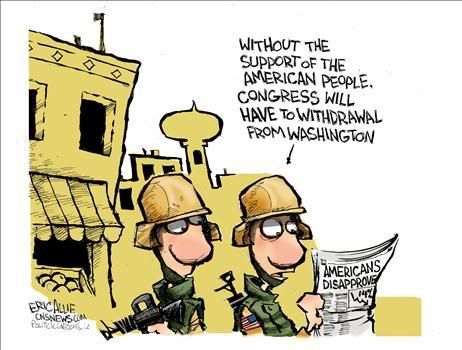Their bottom line: "There is enough good happening on the battlefields of Iraq today that Congress should plan on sustaining the effort at least into 2008."
That's not what almost all their fellow Democrats in Congress want to hear. Freshman Rep. Nancy Boyda of Kansas, who unseated Republican Jim Ryun last fall, bolted from a hearing room when retired Gen. Jack Keane described positive developments in Iraq. When she came back, she explained: "But let me first just say that the description of Iraq as in some way or another that it's a place that I might take the family for a vacation -- things are going so well -- those kinds of comments will in fact show up in the media and further divide this country, instead of saying, here's the reality of the problem. And people, we have to come together and deal with the reality of this issue."
But reality can change -- and in war it often does. For George W. Bush and his leading advisers, the reality of Iraq in June 2003 was that we had won a major military victory and that any postwar messiness was not a big problem. We'd put a proconsul in for a year, set up elections and install an Iraqi government, train Iraqi soldiers and police, and restrict our troops to a light footprint. But that reality changed, into full-fledged sectarian warfare, after al-Qaida bombed the Shiite mosque in Samarra in February 2006.
Bush and his military commanders acted as if that reality hadn't changed, until the voters weighed in last November. Then, Bush made changes, installing new commanders and ordering a surge -- an increase in troops, and a more forward strategy of confronting and cleaning out al-Qaida terrorists. And the reality apparently has once again changed....
Wars don't stand still. In June 1942, the House of Commons debated a resolution of no confidence in Winston Churchill's government. Four months later came the war-changing victory at El Alamein.
Politicians are often trapped in amber...stuck in their own ideological quagmire... but Barone is absolutely correct: wars don't stand still. The only way to make them seem to be doing so is to manage public perception by adjusting your rhetoric and selectively reporting what is happening in order to make it seem like nothing new is happening.
What will the Democrats and the left do, having lived by the polls for years by citing them as the absolute moral authority on every issue, if the polls start to go against them?
We have a hint of the kind of behavior to expect here.
I predict that polls that the left deem "counterintuitive" (i.e., the results don't fit in with their template) will be actively supressed or minimized. On some level they understand that wars don't stand still, and they simply can't bear the thought of victory being snatched from the jaws of their defeatist rhetoric. That's why they are so desperate to ensure that defeat be officially declared now, no matter what the reality on the ground may be.
It's all about manipulating the perception of reality, while being completely indifferent to actual reality.
When playing games like that, it is always important to leave a little wiggle room to be able to argue that they actually supported victory all along (just in case) --that's why there is such a huge gap between the Democrat's rhetoric as they pander to the left; and their actual actions when they vote.
They want to be able to have their ideological cake (i.e., support from the anti-American left) and eat it too.
Any disparity between military success in Iraq and political success will give them as much room to wiggle as they desire; and the goalposts will be moved as needed to ensure that the public perceives a complete U.S. defeat, no matter what actually happens on the ground.
That's their narrative and they're stickin' to it.

No comments:
Post a Comment